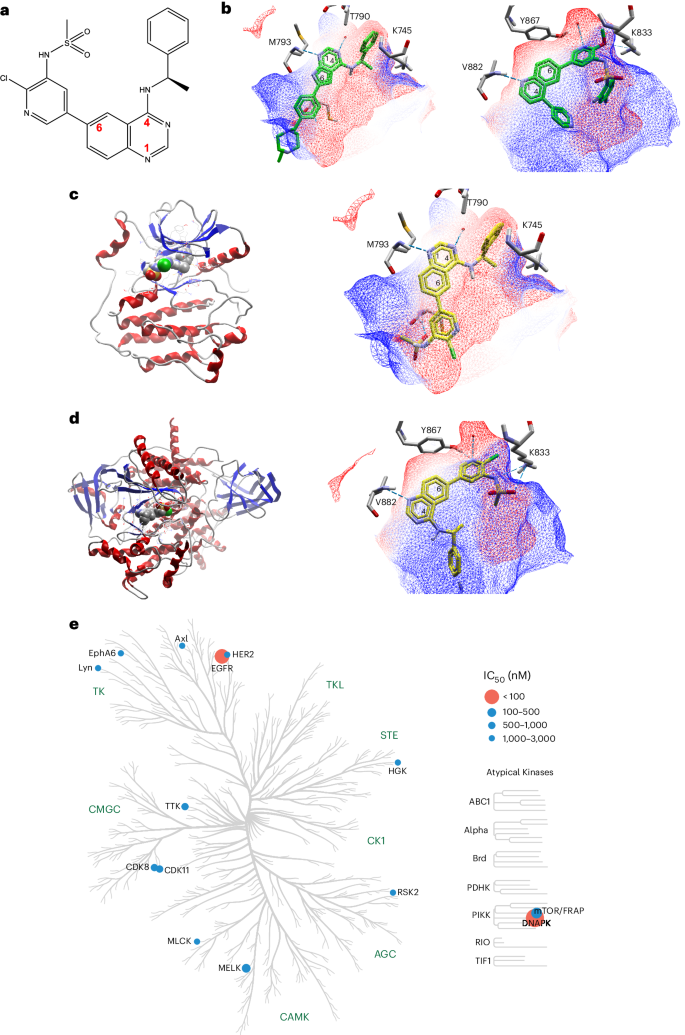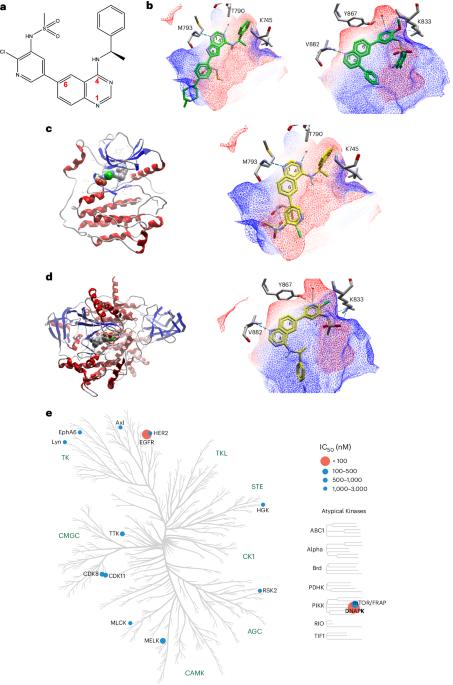A first-in-class selective inhibitor of EGFR and PI3K offers a single-molecule approach to targeting adaptive resistance
IF 23.5
1区 医学
Q1 ONCOLOGY
引用次数: 0
Abstract
Despite tremendous progress in precision oncology, adaptive resistance mechanisms limit the long-term effectiveness of molecularly targeted agents. Here we evaluated the pharmacological profile of MTX-531 that was computationally designed to selectively target two key resistance drivers, epidermal growth factor receptor and phosphatidylinositol 3-OH kinase (PI3K). MTX-531 exhibits low-nanomolar potency against both targets with a high degree of specificity predicted by cocrystal structural analyses. MTX-531 monotherapy uniformly resulted in tumor regressions of squamous head and neck patient-derived xenograft (PDX) models. The combination of MTX-531 with mitogen-activated protein kinase kinase or KRAS-G12C inhibitors led to durable regressions of BRAF-mutant or KRAS-mutant colorectal cancer PDX models, resulting in striking increases in median survival. MTX-531 is exceptionally well tolerated in mice and uniquely does not lead to the hyperglycemia commonly seen with PI3K inhibitors. Here, we show that MTX-531 acts as a weak agonist of peroxisome proliferator-activated receptor-γ, an attribute that likely mitigates hyperglycemia induced by PI3K inhibition. This unique feature of MTX-531 confers a favorable therapeutic index not typically seen with PI3K inhibitors. Sebolt-Leopold and colleagues design and develop a small-molecule inhibitor that can target both epidermal growth factor receptor and phosphatidylinositol 3-OH kinase, which can be leveraged to overcome resistance to targeted therapies in vivo.


表皮生长因子受体(EGFR)和 PI3K 的一流选择性抑制剂为靶向适应性抗药性提供了单分子方法
尽管精准肿瘤学取得了巨大进展,但适应性耐药机制限制了分子靶向药物的长期有效性。在这里,我们评估了 MTX-531 的药理学特征,MTX-531 经过计算设计,可选择性地靶向两个关键的耐药性驱动因素--表皮生长因子受体和磷脂酰肌醇 3-OH 激酶(PI3K)。MTX-531 对这两个靶点都具有低纳摩尔效力,而且通过共晶体结构分析预测具有高度特异性。MTX-531单药治疗可使头颈部鳞癌患者异种移植(PDX)模型的肿瘤一致缩小。MTX-531与丝裂原活化蛋白激酶激酶或KRAS-G12C抑制剂联用,可使BRAF突变或KRAS突变结直肠癌PDX模型的肿瘤持久消退,从而显著提高中位生存期。MTX-531 对小鼠的耐受性特别好,而且不会导致 PI3K 抑制剂常见的高血糖。在这里,我们发现 MTX-531 是一种过氧化物酶体增殖激活受体-γ 的弱激动剂,这一特性可能会减轻 PI3K 抑制引起的高血糖。MTX-531的这一独特特性赋予了它PI3K抑制剂通常不具备的良好治疗指数。
本文章由计算机程序翻译,如有差异,请以英文原文为准。
求助全文
约1分钟内获得全文
求助全文
来源期刊

Nature cancer
Medicine-Oncology
CiteScore
31.10
自引率
1.80%
发文量
129
期刊介绍:
Cancer is a devastating disease responsible for millions of deaths worldwide. However, many of these deaths could be prevented with improved prevention and treatment strategies. To achieve this, it is crucial to focus on accurate diagnosis, effective treatment methods, and understanding the socioeconomic factors that influence cancer rates.
Nature Cancer aims to serve as a unique platform for sharing the latest advancements in cancer research across various scientific fields, encompassing life sciences, physical sciences, applied sciences, and social sciences. The journal is particularly interested in fundamental research that enhances our understanding of tumor development and progression, as well as research that translates this knowledge into clinical applications through innovative diagnostic and therapeutic approaches. Additionally, Nature Cancer welcomes clinical studies that inform cancer diagnosis, treatment, and prevention, along with contributions exploring the societal impact of cancer on a global scale.
In addition to publishing original research, Nature Cancer will feature Comments, Reviews, News & Views, Features, and Correspondence that hold significant value for the diverse field of cancer research.
 求助内容:
求助内容: 应助结果提醒方式:
应助结果提醒方式:


